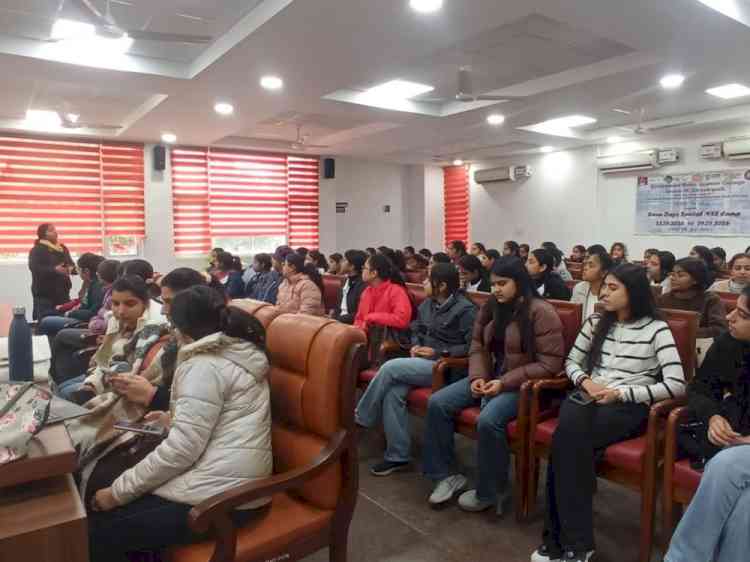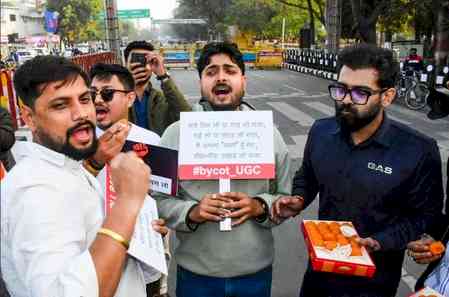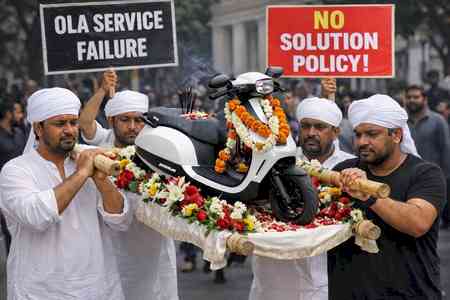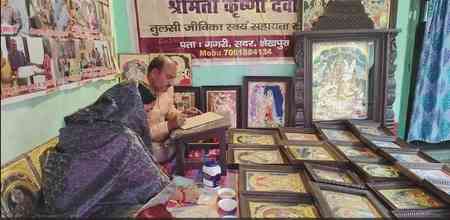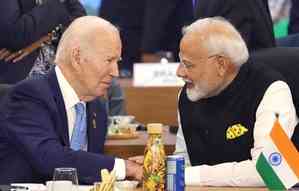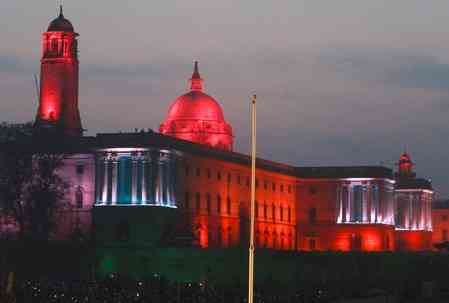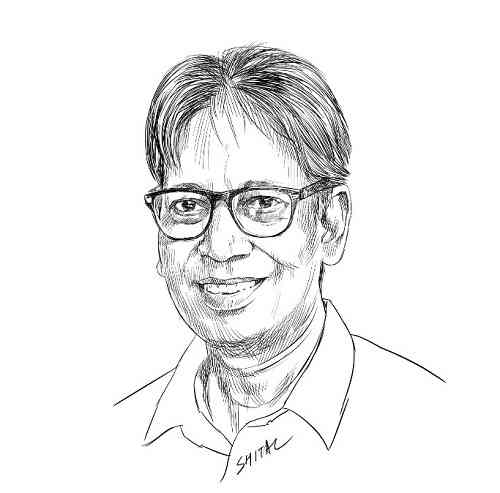3 Day Online International Conference on Mahatma Gandhi concludes at PU
Shri Ram Madhav delivered Valedictory Address
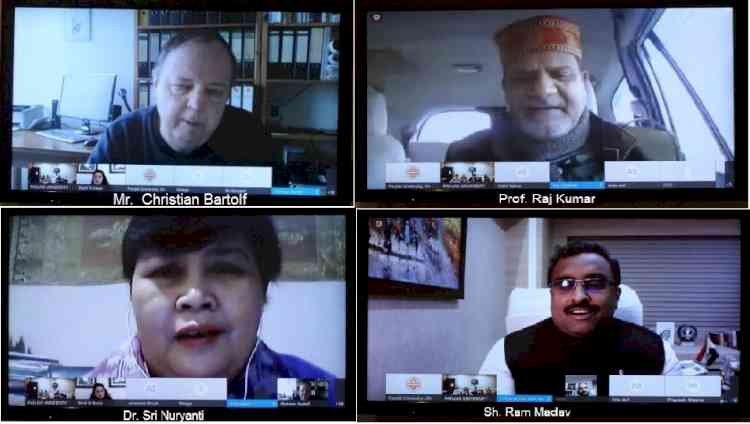
Chandigarh: The concluding day of the online International Conference on ‘Ideology and Vision of Mahatma Gandhi: Global Relevance in 21st Century” on started with Session V- A panel discussion on “Sarvadharma Sambhava- Gandhi’s Principles of Non-Violence, Tolerance and Pacifism” which was moderated by Ms Rami Desai, Advisor, Centre for Soft Power and Diplomacy, India Foundation, New Delhi.
The session began with Mr. Christian Bartolf, President Gandhi Information Centre, Germany, sharing his observations culled from the reported interactions of Mahatma Gandhi and Aldous Huxley. The Huxley family was renowned for the intellectuals, scientists and thinkers it spawned and was associated with Mahatma Gandhi since three generations, beginning from the time of his Grandfather. Huxley Senior was very much interested in Gandhi’s concept of liberal education and how it prepares man to be one with nature. In his book Hind Swaraj, Gandhi mentions the Theory of Evolution and how it prepares an individual to take on any challenge.
The evolutionary Biologist Julian Huxley, who was the brother of Aldous Huxley had been carrying on a fruitful correspondence with Gandhi. One letter out of the series of letters exchanged was published on October 19, 1947 in the Hindustan Times. In this letter, Gandhi expounds on his ideas of education and how human duties are the fundamental on which all human rights are based, as taught to Gandhi by his Mother, who was unlettered but wise and steeped in ancient Indian knowledge and culture.
Aldous Huxley visited India during the time of the Kanpur session of the Indian National Congress that was chaired by Sarojini Naidu in 1925. He was much impressed by Sarojini Naidu, but much more so with Mahatma Gandhi who he likened to a modern day saint. Huxley wrote extensively about his experiences in India and described Gandhi as a ‘Saintly Authority’ who had the wisdom, tolerance, ability to make great selfsacrifice, indomitable will, temperance and moral fortitude of ancient Indian sages. Gandhi was unique in the sense that he combined all this with the political sagacity and ability to sway masses of the modern political mind which made him so effective as a leader of the masses.
The next speaker, Dr. Sri Nuryanti, from the Research Centre for Political Studies, Indonesian Institute of Sciences delved on Gandhian relevance in the period of the Pandemic and the fact that the Covid-19 pandemic is a test for Humanity. Dr. Sri compared the responses to Covid19 virus in the Indian and Indonesian contexts and how different countries have tried to follow different strategies to combat the spread of the virus. She reminded the audience of how relevant was Gandhi’s emphasis on health being the ultimate wealth and also being vocal for local. India’s successful vaccination program has flattened the curve in India which provides a 2 great example of how healthy systems in even a populous country can respond to pandemic challenges.
The last speaker of this session was Shri P.V. Rajagopal, Gandhian Convenor, Parliament of World’s Religions, Chicago, US who spoke on the theme of Theory and Practice of Non Violence. In his address, Shri Rajagopal spoke about how Gandhi had influenced and inspired D.r Martin Luther King in the struggle for American Civil Rights. People need to have a big heart and be sensitive to minorities and in the words of Sardar Patel, “There has to come a time in India, when there will be only Indians and no minorities.” Gandhi advocated that minorities and the mainstream must live in complete harmony and that was the reason he instituted the Sarva Dharma Parathana or All Religions Prayer as he felt that in a country like India, there was a need for people to be aware of and respect each other’s faiths and beliefs. The words ring true even today.
The session concluded with an interactive session where questions from the audience were answered by the distinguished panelists. Ms Rami Desai delivered the Vote of Thanks.
Session VI of the Valedictory Session was moderated by Professor Rani Mehta, Chairperson, Department of Sociology, Panjab University, Chandigarh. She welcomed the dignitaries and guests.
The Chief Guest, Shri Ram Madhav ji, Member, Board of Governors, India Foundation delivered the Valedictory Address. Sh. Ram Madhav ji highlighted how Mahatma Gandhi, a devout follower of satya, believed in the oneness of India and fought against the idea of partition. For Mahatma Gandhi, the ideology of India being one nation, must not yield to the idea of separate countries for Muslims and Hindus. To uphold his faith in oneness of India, he kept appealing to Muhmmad Ali Jinnah against the partition. Nevertheless, the Indian constitution, ignored the idea of oneness in India as a nation where the nation is described as ‘union of states’ and it starts with not ‘India, as nation’ but ‘we, the people’, imitating the opening of US Constitution. He further elaborated that there is a need to uphold the Satya of Mahatma Gandhi who strove for unity of India as a strong, organic nation. He also lamented that modern leaders while following the ideals of Mahatma Gandhi, have fallen into the trap of ‘political correctness’ where the Gandhian tools of satyagraha remained confined to external identities like wearing Gandhian caps but sidelining the creed of ahimsa (non-violence) which was central to Gandhian struggle. He submitted that democracy or any other movement for Mahatma Gandhi must confine to the fundamental ideology of giving ‘voice to the voiceless.’
Prof. Cillian Ryan, Pro Vice Chancellor, International Nottingham Trent University, UK, in his remarks thanked Prof Raj Kumar for providing the opportunity of collaborative academic venture. The conference fulfilled its purpose by dilating on the thoughts and vision of the conference and expounding well its relevance in contemporary times. Mahatma Gandhi stood tall all over the world for his struggle to empower the marginalized. He championed their cause by applying the methods of truth and non-violence. His philosophy and vision is relevant more during the present pandemic. 3
Professor Robert Mokaya, Pro Vice Chancellor, Global Engagements, University of Nottingham, UK the Guest of Honour could not join on account of unforeseen emergent engagement but he conveyed his best wishes for the session and congratulated the organisers for organising three day successful conference.
Earlier, Professor Raj Kumar, Vice Chancellor, Panjab University, Chandigarh greeted the Chief Guest Shri Ram Madhav ji, Guests of Honour, Prof Cillian Ryan, Prof Robert Mokaya in absentia and the participants. He congratulated the organisers of the conference for its complete success. He thanked India Foundation, New Delhi, Nottingham Trent University and University of Nottingham for collaborating with Panjab University, Chandigarh in organising the Conference to celebrate the 150th birth anniversary of Mahatma Gandhi. The achievements of Mahatma Gandhi with regard to service of humanity are as relevant today as in the past, said Prof Raj Kumar. He expressed his full satisfaction at the deliberations of the conference which have succeeded in providing the guideline and direction to follow the path of humanity and mutual cooperation all across the globe which is the need of hour especially during the present challenging time of pandemic and which sets the future course of action on the same lines.
Professor Anju Suri, Dean, International Students, Panjab University, Chandigarh read out the detailed Conference Report encompassing the proceeds of the conference for three days and underlying the significant facts and the features of various papers presented by distinguished speakers during the course of the three day Conference. In all 16 paper presentations were made besides the inaugural and valedictory addresses. The online platform of Conference was well utilised to discuss at length various aspects concerning Mahatma Gandhi’s ideology and vision on sustainable living, education, service of humanity and sarvadharma-sambhava. The deliberations held for 3 days of the conference reaped rich fruits, especially at the time when the world is passing through tough times of pandemic, Covid-19 as they added a new dimension to the thoughts and made the participants realise fully the fact that entire world is like a large family. The pacifist principles as preached by Mahatma Gandhi may help the large global family extend mutual cooperation in terms of sharing resources among one another to live in peace and harmony.
Book release of ‘Because India Comes First’ and discussion on the book followed the valedictory session in which Prof Anju Suri, moderator of the session, put forth various minute nuisances observed by her in the book ranging from ‘concept of sheel’, ‘Akhand Bharata’, ‘giving voice to the depressed with abrogation of Article 370.’ Panel Members which included Prof Devinder Singh Thakur, Prof Simrat Kahlon, Prof Anupama Sharma, Prof Monica Munjial, Prof Rani Mehta, Dr. Namita Gupta and Dr. Priyatosh Sharma discussed various other aspects of the book ranging from Jammu and Kashmir, Former Prime Minister Sh. Atal Bihari Vajpayee ji, Demographic Dividend, Objectification of women, political correctness in politics and other governance model.


 cityairnews
cityairnews 

